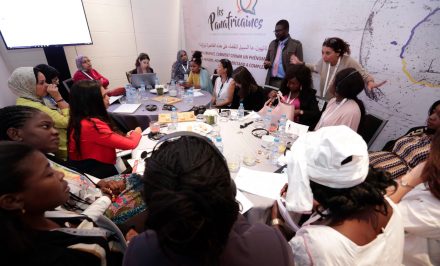 Cameroon : Dr. Yasmine Ndassa, the research scientist turned data storyteller
Cameroon : Dr. Yasmine Ndassa, the research scientist turned data storyteller
 Julien Ngum Che : advocating for the rights of displaced women and youth in Cameroon
Julien Ngum Che : advocating for the rights of displaced women and youth in Cameroon
 Chilufya Mutale Mwila, the Zambian entrepreneur driving financial inclusion across Africa
Chilufya Mutale Mwila, the Zambian entrepreneur driving financial inclusion across Africa
 Wangari Muchiri, the Kenyan engineer committed to accelerating the ecological transition in Africa
Wangari Muchiri, the Kenyan engineer committed to accelerating the ecological transition in Africa


– « Les Panafricaines » benefited from the expertise of very high-level accompaniers.
– The workshops’ teachings and discoveries will be used as the basis for the development of the network’s action plan for 2018-2019.
Casablanca, October 26, 2018 – The first day of the Africa Women Journalists Forum “Les Panafricaines” ended Friday (October 26th) in Casablanca. After a morning dedicated to enriching exchanges and debates, which highlighted the need and the importance of the objective media treatment of migratory movements, “Les Panafricaines” devoted the afternoon to thematic workshops behind closed doors.
7 workshops were dedicated to various dimensions of the migration issue. The first workshop provided answers to a fundamental question: “What kind of journalistic treatment for migration issues?”. Exchanges were led by Mehdi Alioua, doctor of sociology and teacher-researcher in political science, and President of the anti-racist association “GADEM”. At the end of the workshop, he stated that “ethics must be at the center of the journalistic profession. This should be broken down into several aspects, including semantic and linguistic vigilance. Indeed, the language used in the media is a powerful vector of opinion hence the need to stop and rethink the use of some common terms such as “sub-Saharan”, “Africans”, “clandestine”; … which in the long run, shape negative perspectives around the migration issue”.
The second workshop was organized around the theme “Wandering Minors, Identifying a Complex Phenomenon?” Dr. Najat Mjid, Independent Expert on Children’s Rights at the United Nations and Founder of the Bayti Association for Homeless Children, stressed on this occasion “the importance of respecting a code of ethics and conduct in dealing with the issue of child migration in the press. We must balance the best interests of children with the demands of ratings and media objectives.”
The third workshop focused on “Women’s Mobility: a New Migratory Dynamic” . The expert Awa Meite Van Til, Director and activist for migrant rights, emphasized "the importance of highlighting the universality and the progressive feminization of the migration phenomenon. That said, despite many commonalities between our respective paths, we must know how to value the diversity and richness of our individual experiences.”
Revolving around the theme “Climate Migration and Food Security”, the 4th workshop focused on the worrying dimension of climate change and its impact on population displacements in Africa. Marouane Touali, researcher and specialist in migration issues and chargé de mission at the National Council of Human Rights (CNDH) reminded the audience that “this is a crucial issue, which is common to the whole African continent". According to him, the participants expressed their need to have access to more information on the impact of climate change. “We need a network of experts to support them, they must also approach UN entities such as IOM or UNEP to have access to more relevant information.”
The 5th workshop was dedicated to the “Intra-African Migration: a Chance for Development”. It was an opportunity for Abdou Souléye DIOP, former chairman of the Africa and South-South Commission at the General Confederation of Moroccan Enterprises, to highlight the many positive consequences of intra-African migration, including "the development of numerous sectors of activity in the host countries, the cultural mix that allows countries to open-up to the rest of the continent, the development of intra-African trade, and even the acceleration of regional integration …”.
The 6th workshop, organized around the theme “African Migration: the Importance of Having Reliable Data”, allowed Fernande Irene Ekouta, editorial coordinator at “lejournalducameroun.com”, to highlight a central issue shared by all African media: “For now, we rely on international organizations such as IOM or the Red Cross, with regard to African migration data. That said, we are enthusiastic about collecting data from the continent, including governmental sources. In terms of treatment and professional ethics, it is sound to handle data from international organizations with a critical eye. The systematic emphasis on figures currently provided give the impression of imminent catastrophism. We need to rely on updated studies and data which will allow us, as journalists, to provide our readers and listeners a clear and objective analysis on the migration issue.”
The 7th and last workshop dealt with: “Structures and Organizational Model of ‘Les Panafricaines’ Network”. The workshop’s facilitator, Adil Maazouz, legal affairs specialist in the media sector, summarized the importance of "sustaining and professionalizing the action of ‘Les Panafricaines’ by setting a solid and appropriate legal framework. Many options are available to our colleagues who, given the wealth of content produced by the network, have a deep interest in capitalizing on its continental and even global ramifications thanks to the various diasporas and their international expertise”.
The second edition of the Pan-African Forum brings together in Casablanca more than 200 women journalists from 54 countries.
The mobilization of “Les Panafricaines” will take place over 2 days. This first day was dedicated to debates and workshops, which will tackle the different facets of migration on the continent.
The second day will be devoted to the restitution of the work, and to a vote that will determine the priorities of the action plan to be deployed in the year 2018-2019 by the network.